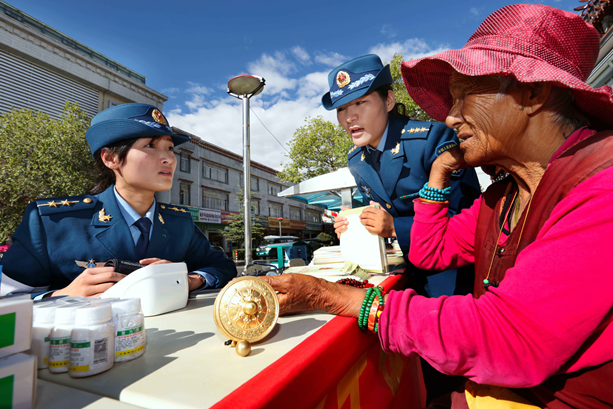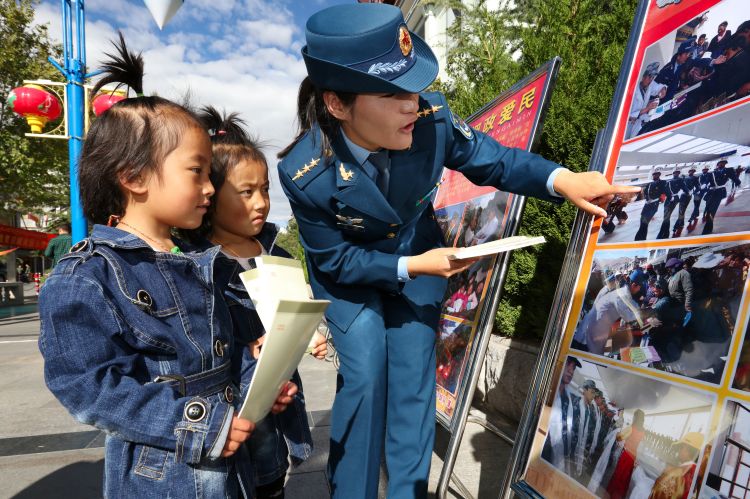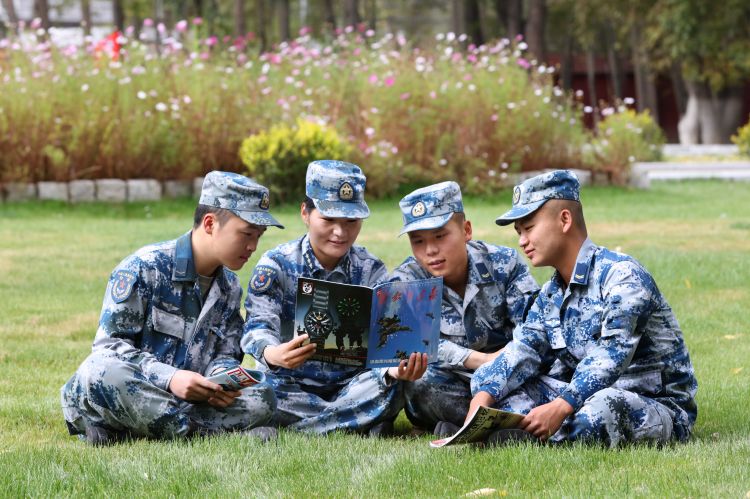Spring Bud Project Brings a New Life to Tibetan Woman
"I am so lucky the Spring Bud Project has given me an opportunity to lead a different life," Sonam, from a once-impoverished rural family in Sa'gya, a county in Southwest China's Tibet Autonomous Region, often says. Her tone is filled with gratitude.
Sonam, at age 6, became the first girl in her village to enroll in primary school. After she graduated from university, in 2011, she became the first woman officer in the People's Liberation Army (PLA) from Sa'gya.
During the past 11 years, Sonam has cherished her work in the PLA. She has also been fully committed to all types of activities and projects conducive to enhancing unity and solidarity between the PLA and Chinese citizens. She has also done her utmost to give back to society.
"I am Sonam, a woman PLA officer of the Tibetan ethnic group, and who has grown up with the enormous assistance of the CCTF and the PLA Air Force under the framework of the Spring Bud Project, and with the support of the All-China Women's Federation and the Tibet Women's Federation," she said during a recent symposium. She added she will never forget the assistance she has received, as it has made such a difference to her life.

Sonam was born into a herdsman's family in 1988. She recalled how it was once an unrealistic dream for her to walk out of the mountains and attend school.
The Spring Bud Project was implemented in Tibet in 1994. At that time, the national nine-year compulsory education had not been fully realized in Tibet, and none of the residents in her village had ever attended school.
In 1994, a primary school in Sa'gya established a Spring Bud class for girls. After learning about the class, Sonam's parents asked her if she wanted to attend school. Although she didn't know what a school looked like, she immediately replied "Yes," because she was eager to see the outside world. Sonam enrolled, and she was one of 50 students in the class. A year later, the class began receiving financial assistance from the PLA Air Force, and the class joined the Blue Sky Spring Bud Project.
Sonam still remembers how the uniform she had to wear to the Spring Bud class was very beautiful, and that her family did not have to worry about tuition fees and stationery.
Sonam says she and the other students in the Spring Bud class grew up feeling the love and care of the women's federations and the PLA Air Force. She says she cherished the valuable opportunity, and so she studied hard.
Six years later, Sonam became the only student from among her classmates to walk out of Sa'gya and enroll in a Jinan-based middle school (in East China's Shandong Province) for Tibetan children.
Three years later, Sonam enrolled in high school, and after graduation she enrolled in the University of International Business and Economics (UIBE), in Beijing.
"Without the Spring Bud Project, I might have grazed cattle in the mountains like other people in my hometown, and I would never have had an opportunity to study in a key university," Sonam says, recalling her bittersweet experience.
Sonam passed the civil servant examination during her last year of university. Later, she passed on the job she was offered and instead joined –– through a recruitment program especially for former Spring Bud students –– the PLA Air Force.
Sonam was one of five soldiers recruited in 2011 from among the Tibetan college graduates. She was both excited and nervous when she first wore her military uniform, especially because a donation ceremony hosted by the PLA Air Force, at UIBE (in 2011), was the first event where she wore the uniform.
Her story of joining the PLA quickly became known by everyone in her hometown. Her parents were excited, and they were proud of her.
Since she joined the PLA Air Force, Sonam has been responsible for promoting mutual support between civilian sectors and the military, security-related missions, and various other administrative jobs. She has received high praise from her supervisors, and from other colleagues.

Moreover, Sonam has given full play to her Tibetan identity, especially when organizing and participating in special activities designed to improve relations between the PLA, local governments and the people.
In recent years, Sonam's troop has financially supported the building of nine Blue Sky Spring Bud primary schools, and one Blue Sky Spring Bud kindergarten, in Tibet. She has always been a liaison in visits and donation activities related to such projects.
In addition, she has been directly involved in poverty-alleviation projects in seven Tibetan villages since 2016, when her troop implemented its collaborative- and paired-assistance efforts.
Sonam often tells others she is delighted when she sees ordinary people, like her parents, receiving assistance from the PLA Air Force. She plans to extend assistance to more in-need people in the years to come.

In recognition of her excellent performance, Sonam has been awarded the third-class merit by the PLA, and the titles of Tibet March 8th Red-Banner Holder and Tibet Role Model for Ethnic Unity. In addition, the government of the autonomous region in 2019 recognized Sonam's troop with an award for its poverty-reduction efforts in the region.
Sonam says the Spring Bud Project has provided thousands of girls, like herself, with valuable opportunities to continue their academic studies, grow up healthy and lead a life with bright prospects.
Inspired by the stories of Sonam and other Spring Bud girls, many families have been encouraged to send their children to schools, and to support them in their efforts to pursue better lives outside their hometowns.
The autonomous region has also provided financial support; specifically, the region's government has paid for the food, accommodation and learning materials of children of farmers and herdsmen during their nine-year compulsory education.
Many of Sonam's former Spring Bud classmates have landed jobs as civil servants, teachers or doctors, and they have all worked diligently in their posts.
Furthermore, Sonam and her former classmates are planning to establish a special working team to enhance ties between the military and civilian sectors.
They will volunteer to be teachers in remote villages, and they will explain policies of the Party (Communist Party of China), and about health, laws and national defense to students and their families.